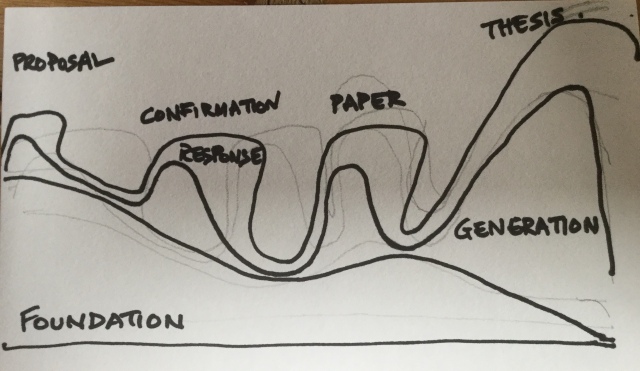It’s pretty common to hear academic writing described in three stages – (1) thinking and preparation or pre-writing, (2) writing, and (3) post writing revision. In the doctorate you do pre-writing until you get to ‘writing up’. And that’s when you write and revise.
But it’s not really like that – lots of thinking goes on as the thesis is being written and polished. And there’s been lots of writing in order to get to the point of thesis writing. The reality is that you think and write all the way through the doctorate, and most of that thinking and writing is directed to the final thesis text.
I’ve often wondered if there was a better way to describe the way that writing happens during the doctorate. Something better than pre-writing, writing and post writing revision. I think I’ve finally come across it in one of the many books about creative writing I’ve been accumulating.
Graeme Harper tackles the problem of the three stages writing model in his book Critical Approaches to Creative Writing. (2019).
The problem with the very idea of three stages, Harper says, is that it’s linear. The writing process is represented as the writer moving through each stage in turn. One after the other. First of all you prepare, then you write and then you revise.
But this is not what actually happens in practice, he says. While you might do a lot of preparatory work at the start of writing a novel, you may not actually stop doing that kind of work for quite a while – you may well find that you have to go and search for additional information or do some additional plotting as you are writing. And you may find you are revising some parts of the text as the same time as you are writing new sections. It’s not a question of a neat sequence of steps, each distinct and separate from the other, but something much more messy.
Harper’s description of the creative writing process rang bells for me. His description of overlapping processes seemed a lot like thesis writing where there are often various types of writing happening at once.
Harper doesn’t stop with debunking the three stages approach. He offers an alternative framework for thinking about creative writing. Rather than serial stages, he proposes three modes of writing which are blended throughout a project. He calls these three modes foundation, generation and response.
- Foundation is all of the work that underpins the actual writing – think of it as architecture or infrastructure, Harper says. Foundational work grounds and holds writing together.
- Generation is writing new text. Generating text involves drafting and some redrafting until you get to the point where you have a whole working text. Harper says generation is best thought of as a process of initiation and creation.
- Response is when you come at your text anew, reflect on it in its entirety and refine it. Response takes something which is not yet fully fashioned and fashions it. Response is the writer reflecting on their own text, but could also include other readers’ responses too. Harper argues that response also encompasses thinking about how the final text will be published and distributed for wider public response.
Now the key to Harper’s argument is that these three are not linear stages. They operate as a kind of plait. While foundation might be dominant at the start of writing, the other two are also often involved.
I reckon Harper’s three modes of writing are helpful in thinking about writing a thesis too.
In the doctorate we can therefore think of:
- Foundation as – reading and noting, keeping a research journal, field notes, transcripts, data files, records of analysis, mind maps, plans, spread sheets, storyboards, emails, blog posts, writing for supervision purposes, annual reports and reviews, chunks about specific aspects of research …
- Generation as – producing a research proposal, writing a confirmation or upgrade paper, writing a conference paper, journal article or book chapter, writing the thesis text …
- Response as – getting feedback on and refining the research proposal, a confirmation or upgrade text, a conference paper, journal article or book chapter, and the thesis text. Developing a publication plan from the thesis …
We can see that these three modes helps us to see the writing going all the way through the doctorate. And to see that each mode of writing is important and can’t be ignored. Failing to do enough foundational work means that both the generation and response writing stages will be stymied. They won’t have the necessary strength to stand up. And failing to spend enough time on response, thinking that generation of text is sufficient, means that the writing will be incomplete and unrefined.
And an added bonus. The three writing modes can be used to begin to (re)think how writing gets done in the doctorate. Harper’s three modes shows time marked not by linear stages but by the various kind of texts that need to be produced at different times.
I imagine a doctorate might go a little like this.

OK, so I’m not the best at illustrating but I’m sure you get the idea.
But perhaps you might like to play with your own doctoral timeline, thinking about the ways in which the three modes of writing might occupy your week and year variously, depending where you are up to in the path to the final doctoral thesis.
And perhaps you too will find Harper’s three modes of writing a more helpful way to think about the writing that has to be done – all the way through the candidature – in order to produce a good thesis.

No comments:
Post a Comment